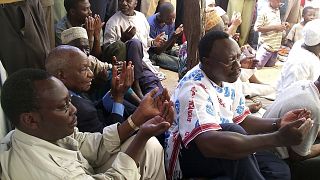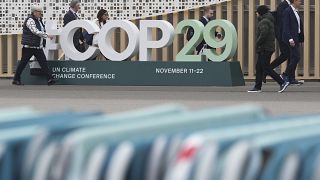Switzerland
As the World Economic Forum (WEF) in Davos concludes, attendees reflect on the dominant theme that emerged during meetings, the discourse around artificial intelligence.
The rapid ascent of OpenAI's ChatGPT and its competitors over the past year has thrust the power, potential, and implications of AI into the forefront of public attention.
OpenAI's Chief, Sam Altman, was present at this year's summit, accompanied by top executives from Microsoft, a significant supporter of OpenAI's growth. Analyst Ian Bremmer of the Eurasia Group noted the lack of opposition from established players in the industry, emphasizing the remarkable acceleration of progress in Artificial intelligence, despite acknowledging potential disruptive implications.
"I mean, the most important issue that's been discussed here, by almost every delegate, is where artificial intelligence is going. The most exciting piece of that, it is not really being opposed by incumbent players. Usually when you have a new technology, there are very powerful people that feel like they have to stop it. So you look at climate change and transition energy that's trying to kill fossil fuels, so they're going to try to stop it. AI every powerful corporation, every major government sees that this is something that they need to deploy, they need to engage, and they need to use. That's going to make it faster. So that's interesting. There are a lot of potentially disruptive implications that are negative, but it's not going to slow it down. And so you do get this feeling of incredible accelerating progress and wow 2024 could be incredibly exciting around this and could be dangerous, could have some risks," according to Eurasia Group analyst, Ian Bremmer.
The overarching theme of this year's World Economic Forum was "Rebuilding Trust," as business and political elites gathered in the Swiss Alpine snows. However, the takeaway from the event suggests that the world still faces significant challenges in rebuilding trust.
Rich Lesser, Chairman of Boston Consulting Group, acknowledged the unrealistic expectation that a single meeting, even one as prominent as Davos, could rebuild trust across fragmented dimensions. However, he highlighted the thousands of conversations spanning social, private, and public sectors as a starting point for trust rebuilding.
"I think it's unrealistic to think that Davos or any meeting, anywhere in the world, in one meeting can rebuild trust when it's fragmented on so many dimensions. I do think the number of tens of thousands of conversations with leaders all around the world and different communities, social sector, private sector, public sector, I do think it helps to create a starting point for rebuilding trust. Of course, it doesn't solve the problem within itself," said Rich Lesser.
Issues ranging from conflicts in Ukraine and the Middle East to concerns about corporate and tech leaders prioritizing profits over worker displacement with AI have contributed to a shortage of trust. The annual Davos meeting serves as a barometer of the mindset of global decision-makers, revealing a landscape of skepticism and uncertainty.
While attendees concluded that the global economic outlook appears brighter, with indications of peaking interest rates and inflation in major markets, uncertainties persist. Intractable wars and upcoming elections in regions such as India, the European Union, South Africa, and the U.S. remain unpredictable factors that could redirect the world in unforeseen ways.












01:38
Chad hosts over 680,000 Sudanese refugees
01:00
Watch: Robot artist Ai-Da makes history with $1.32 Million sale
01:44
Climate change and conflict increase malnutrition rates in Nigeria
02:20
War-traumatized children in Kivu find hope through dance amid conflict
02:10
Electricity, internet gaps hinder AI adoption in Africa
01:00
Fighting rages on both sides of Ukraine-Russia border, as Kiev to present 'victory plan'